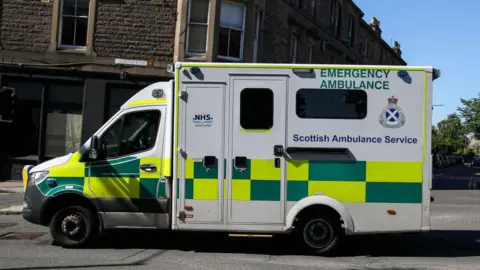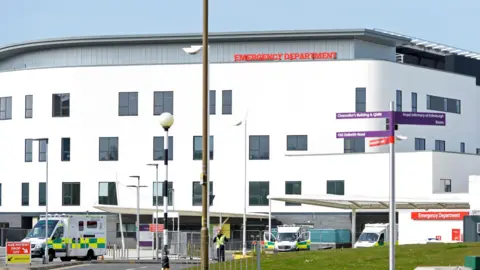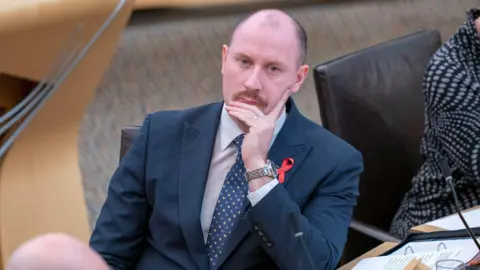Ambulance crews put on highest level of emergency
 Getty Images
Getty ImagesScottish ambulance crews have been put on the highest level of emergency due to "significant pressure" placed on services.
The Scottish Ambulance Service stepped up its resource escalation action plan (Reap) to level four - the highest available status - last week.
The decision means all leave could be cancelled for workers and that all available staff might be called to the front line.
However, the Scottish government insisted that services were still able to urgently treat patients in a critical condition.
A spokeswoman for the SAS said patients who were not critically ill may have to wait longer for an ambulance.
She said: "This is directly linked to system-wide pressures such as lengthy hospital handover times at key areas across the country and the significant increase in respiratory viruses.
"We are working with health boards to do everything we can to get our crews back on the road to help patients.
"Our staff are working extremely hard and we continue to prioritise those patients who are most critically ill."
NHS at 'breaking point'
Colin Poolman, the director of the Royal College of Nursing in Scotland, told the BBC's Good Morning Scotland programme that "huge demand" was becoming a year-round problem.
He said: The pressures are getting unbearable and unsustainable and we need to look at the symptoms of this. All of these are symptoms of a service that is at breaking point and they [the Scottish government] need to invest in all parts of the system."
Mr Poolman said an expanded workforce was required to break a "continual circle" of problems with the health service.
 Getty Images
Getty ImagesA spokesman for the Scottish government said patient safety remained its "top priority".
He added: "Despite continued increased levels of high priority calls, crews responded to 514 of the highest priority calls across Scotland last week in an average time of seven minutes 41 seconds.
"The Scottish government is committed to ensuring that there are no unnecessary delays in transferring patients to hospital and we continue to work closely with health boards and the SAS to maintain a fast response to the most critically unwell."
The Daily Record newspaper has reported that one patient in Edinburgh had to wait 12 hours in an ambulance outside the Royal Infirmary last week.
 PA Media
PA MediaThe news comes as both the Tories and Labour say more than 2,000 people are estimated to have died this year because they waited too long in Scotland's A&E departments.
Both parties cited research from the Royal College of Emergency Medicine, which says there will be one additional death for every 72 patients who wait between eight and 12 hours in A&E.
The Tories claimed there could have been a "shocking" 2,181 excess deaths this year, basing calculations on the 226,328 patients who waited more than eight hours in the emergency room for treatment throughout 2024.
Labour claimed 147,223 Scots had waited more than eight hours to be seen in A&E and then be admitted, transferred or discharged over the period from January to October this year.
They estimated this would equate to as many as 2,045 excess deaths.
Official statistics from Public Health Scotland showed just under three out of five patients (59.7%) in A&E were seen and subsequently admitted, transferred or discharged within the target time of four hours in the week ending 8 December.
The Scottish government's health secretary Neil Gray said the SNP "remain committed to delivering improved performance across A&E services".
He added that the country's core A&E departments have been the best performing in the UK for the last eight years but that health services remain under pressure following the coronavirus pandemic in 2020.
